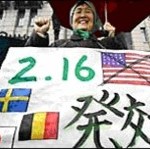The Kyoto Protocol, which aims to slow global warming, has come into force seven years after being agreed.

Some 141 countries - who account for about 55% of greenhouse gas emissions - have ratified the treaty, which pledges to cut these emissions by 5.2% by 2012.
However, the US and Australia have abstained for economic reasons, and developing countries such as China and India are outside its framework.
Kyoto, in Japan, is hosting the main ceremony to mark the occasion.
The treaty has come into force 90 days after Russia's crucial decision to ratify it in November 2004.
Individual targets
The protocol, which became a legally binding treaty at midnight New York time (0500 GMT) on 16 February, demands a 5.2% cut in greenhouse gas emissions from the industrialised world as a whole, by 2012.
Each country has been set its own individual targets according to its pollution levels.
Growing developing countries China and India are outside the framework, a fact pointed out by US President George W Bush when he abandoned Kyoto as one of his first acts when taking office in 2001.
Japan's Prime Minister Junichiro Koizumi issued a statement welcoming the treaty but also calling on non-signatories to rethink.
"From now, we have to build a system in which more nations will work together under the common framework to stop global warming," he said.
Hiroyuki Hosoda, Japan's chief government spokesman, said: "We have been calling on the US to join. But the country that is the world's biggest emitter has not joined yet, and that is regrettable."
Environmentalists plan to hold protests around the world to mark the treaty coming into force - with many targeting the
US.
The main ceremony to mark the entry into force of Kyoto will be held in the ancient Japanese capital where the treaty was reached in 1997. Speakers include Nobel Peace prize winner Wangari Maathai.
Ms Maathai, an ecologist and Kenya's deputy environment minister, said the Kyoto Protocol would require not just efforts from governments and businesses, but also a change in the way people lived.
Tough goals
"One of the reasons why some of the countries don't want to support the Kyoto Protocol is exactly because they don't want to reduce their over-consumptive life pattern," Ms Maathai, the first African woman to win the Nobel Peace Prize, said.
"One way of reducing that over-consumption is by learning to reuse a lot of the resources that we use and just throw away."
But even for countries that have signed up to Kyoto, meeting the goals could be difficult.
Canada, one of the treaty's first signatories, has no clear plan for reaching its target emission cuts. Far from cutting back, its emissions have increased by 20% since 1990.
And Japan is also unsure it will be able to meet its legal requirement to slash emissions by 6% from 1990 levels by 2012.
"Japan will make all efforts



